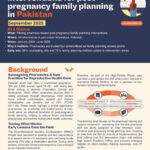
This PMAC learning brief examines the pharmacy training and support aspects of a pilot study in two peri-urban union councils in Islamabad Capital Territory. It highlights how frontline pharmacy staff are trained to provide informed, client-centered post-pregnancy family planning care. Drawing on data from the first six months of the study, the brief showcases how the intervention aligns with High Impact Practices (HIPs), offering insights into client profiles, training effectiveness, and family planning uptake.
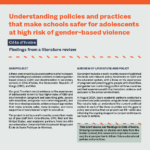
Findings from literature reviews in Côte d’Ivoire, the Democratic Republic of Congo, and Mali
A three-year project by Ipas and partners aims to deepen understanding and evaluate solutions to reduce gender-based violence (GBV) and discrimination in secondary schools in Côte d’Ivoire, the Democratic Republic of Congo (DRC), and Mali.

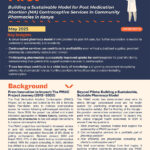
The PMAC model has demonstrated clear wins for clients (through personalized care) and the health system (by positioning pharmacies as accessible contraceptive outlets). But the third leg of the triangle – the provider – remains less understood: Can pharmacies profit while delivering these services?
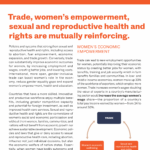
This brief highlights how international, more open, gender-inclusive trade can boost women’s role in the economy, can reduce gender equality gaps, and can expand women’s empower, health and education—and how trade, women’s empowerment and sexual and reproductive health and rights are mutually reinforcing.
To reduce deaths and disabilities from unsafe abortion, Ethiopia liberalized its abortion law in 2005 to allow safe abortion under certain conditions. This study aimed to measure how availability and utilization of safe abortion services has changed in the last decade in Ethiopia, drawing on results from nationally representative health facility studies conducted in Ethiopia in 2008 and 2014. Using the Safe Abortion Care Model as a framework of analysis, the study found that service availability and quality has increased, but that access to lifesaving comprehensive care still falls short of recommended levels.
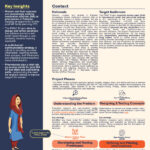
The PMAC project in Pakistan takes a phased approach to gathering insights, developing and testing solutions, and refining interventions as needed to ensure we are addressing the challenges women face in accessing post medication abortion (MA) family planning (FP). This learning brief outlines key insights from developing, testing and refining prototypes (also referred to as the Medium-Fidelity Phase) aimed at increasing women’s access to post MA FP in Islamabad Capital Territory.
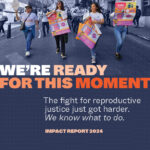

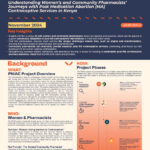
These learning briefs – a project anchor brief, a user-focused brief, and a pharmacist-focused brief – summarize lessons learned by the PMAC project during multiple phases of the project.
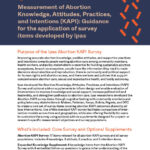
The Abortion Knowledge, Attitudes, Practices, and Intentions (KAPI) Survey with optional add-on supplements, developed by Ipas, is a comprehensive resource designed to assess and enhance community understanding, attitudes and support around abortion care.
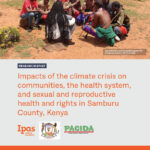
Our research shows how people and the health system in Samburu County, Kenya, are impacted in numerous ways by the climate crisis—and articulates how healthy people and communities are more resilient to the impacts of climate change.
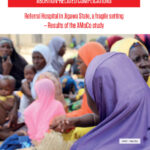
To reduce deaths and disabilities from unsafe abortion, Ethiopia liberalized its abortion law in 2005 to allow safe abortion under certain conditions. This study aimed to measure how availability and utilization of safe abortion services has changed in the last decade in Ethiopia, drawing on results from nationally representative health facility studies conducted in Ethiopia in 2008 and 2014. Using the Safe Abortion Care Model as a framework of analysis, the study found that service availability and quality has increased, but that access to lifesaving comprehensive care still falls short of recommended levels.
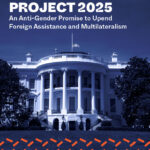
This report focuses on the damage Project 2025 would have on overseas development assistance and international cooperation.
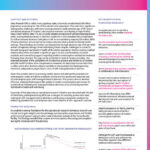
These two learning products – a project brief and a technical brief – describe the Ipas Development Foundation’s work to increase contraceptive uptake and continuation after self-managed medical abortion.
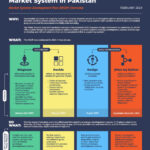
These three learning products — a market systems development plan (MSDP) overview, a workshop event summary, and a low fidelity process infographic — document our project’s efforts to understand, describe, and enhance the post-medication abortion contraceptive market in Pakistan
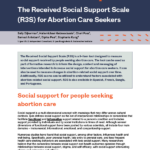
The Received Social Support Scale (R3S) is a 9-item tool designed to measure social support received by people seeking abortion care.
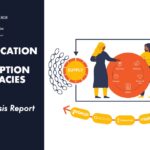
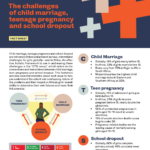
Child marriage, teenage pregnancy and school dropout are intricately linked and present serious, interrelated challenges for girls globally—and in Africa. An effective, holistic framework to use in addressing these challenges is the “CTS nexus,” which refers to the connections and interactions between child marriage, teen pregnancy and school dropout.

